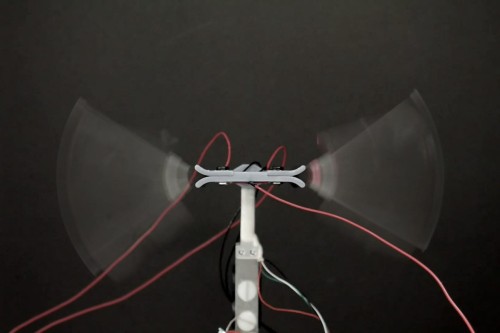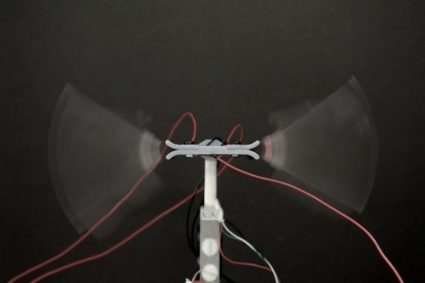[ad_1]

Entrance view of the flying robotic. Picture credit score: Dr Tim Helps
This new advance, printed within the journal Science Robotics, might pave the way in which for smaller, lighter and simpler micro flying robots for environmental monitoring, search and rescue, and deployment in hazardous environments.
Till now, typical micro flying robots have used motors, gears and different complicated transmission programs to realize the up-and-down movement of the wings. This has added complexity, weight and undesired dynamic results.
Taking inspiration from bees and different flying bugs, researchers from Bristol’s College of Engineering, led by Professor of Robotics Jonathan Rossiter, have efficiently demonstrated a direct-drive synthetic muscle system, referred to as the Liquid-amplified Zipping Actuator (LAZA), that achieves wing movement utilizing no rotating components or gears.
The LAZA system drastically simplifies the flapping mechanism, enabling future miniaturization of flapping robots right down to the scale of bugs.
Within the paper, the crew present how a pair of LAZA-powered flapping wings can present extra energy in contrast with insect muscle of the identical weight, sufficient to fly a robotic throughout a room at 18 physique lengths per second.
Additionally they demonstrated how the LAZA can ship constant flapping over a couple of million cycles, essential for making flapping robots that may undertake long-haul flights.
The crew anticipate the LAZA to be adopted as a elementary constructing block for a variety of autonomous insect-like flying robots.
Dr Tim Helps, lead writer and developer of the LAZA system stated: “With the LAZA, we apply electrostatic forces immediately on the wing, reasonably than via a posh, inefficient transmission system. This results in higher efficiency, easier design, and can unlock a brand new class of low-cost, light-weight flapping micro-air automobiles for future functions, like autonomous inspection of off-shore wind generators.”
Professor Rossiter added: “Making smaller and higher performing flapping wing micro robots is a big problem. LAZA is a vital step towards autonomous flying robots that may very well be as small as bugs and carry out environmentally important duties similar to plant pollination and thrilling rising roles similar to discovering folks in collapsed buildings.”
tags: bio-inspired, c-Analysis-Innovation, Flying, Micro
College of Bristol
is among the hottest and profitable universities within the UK.
[ad_2]


